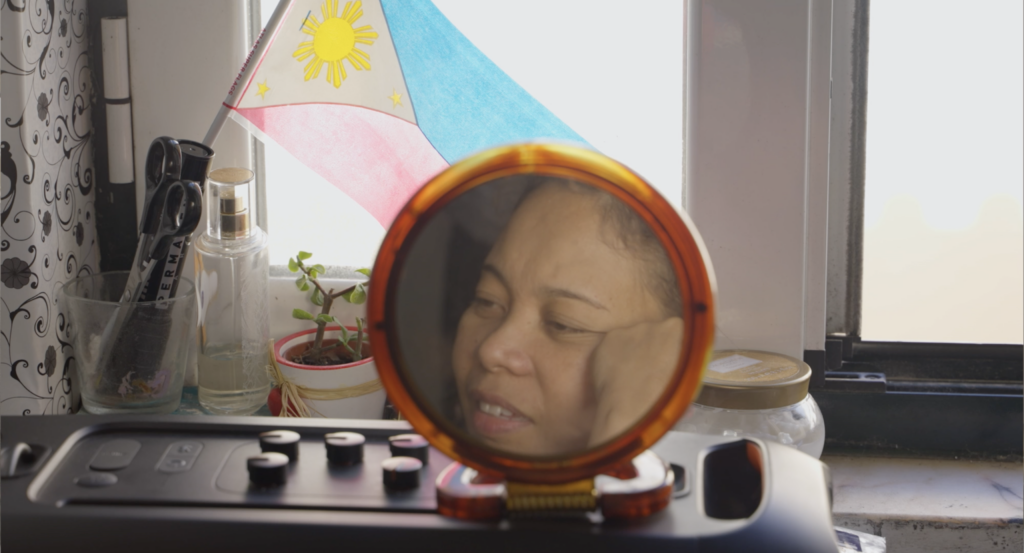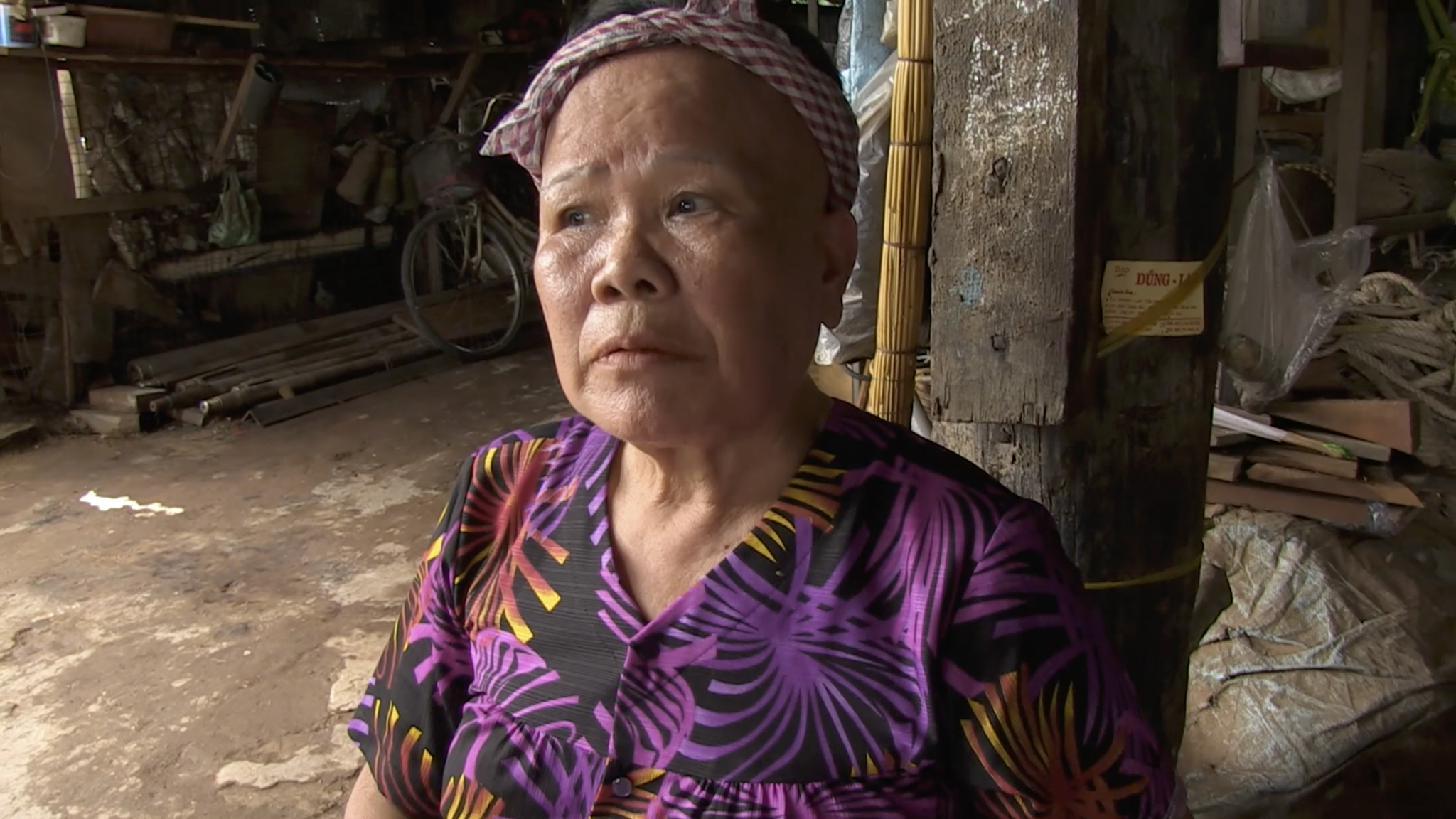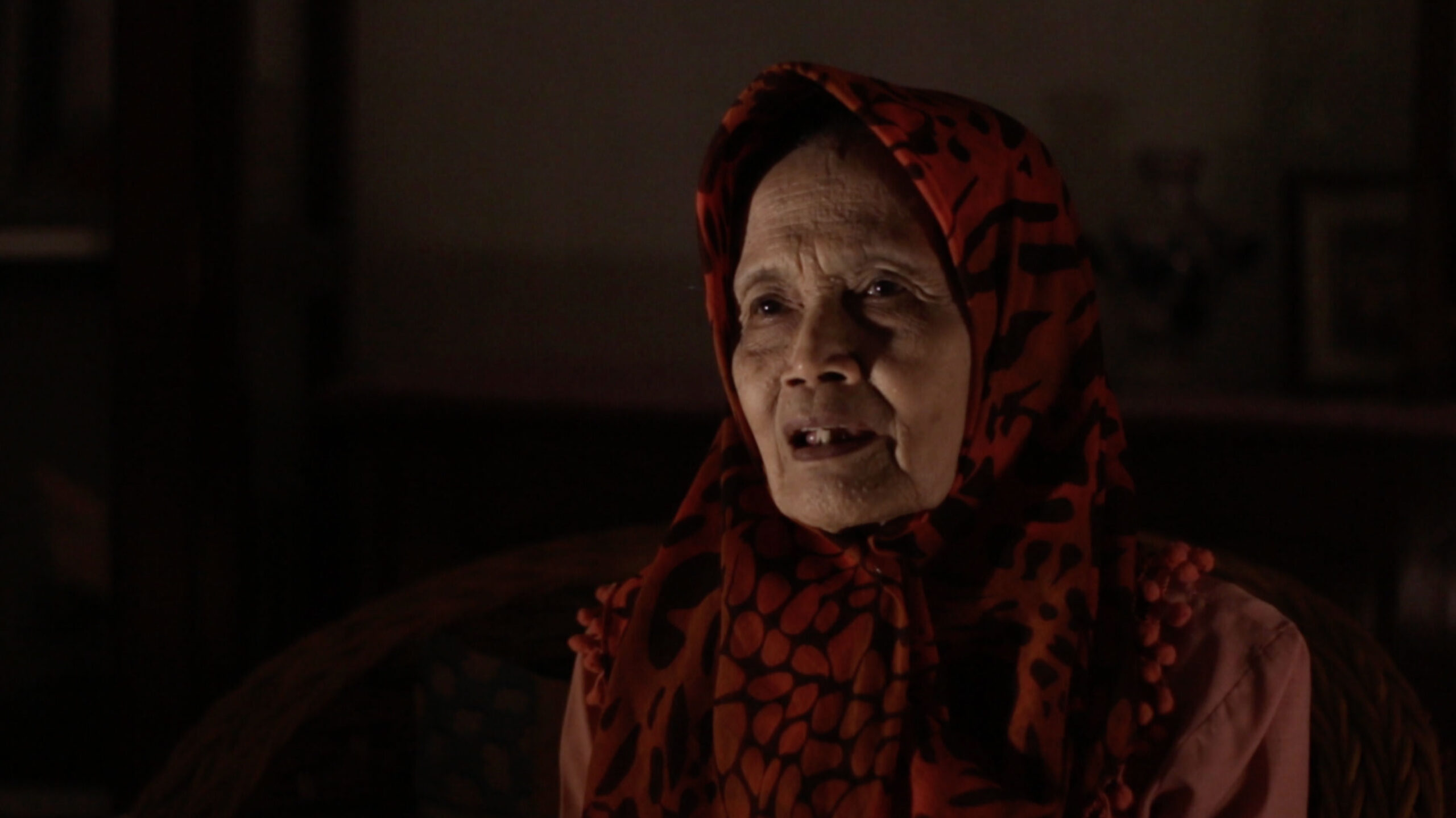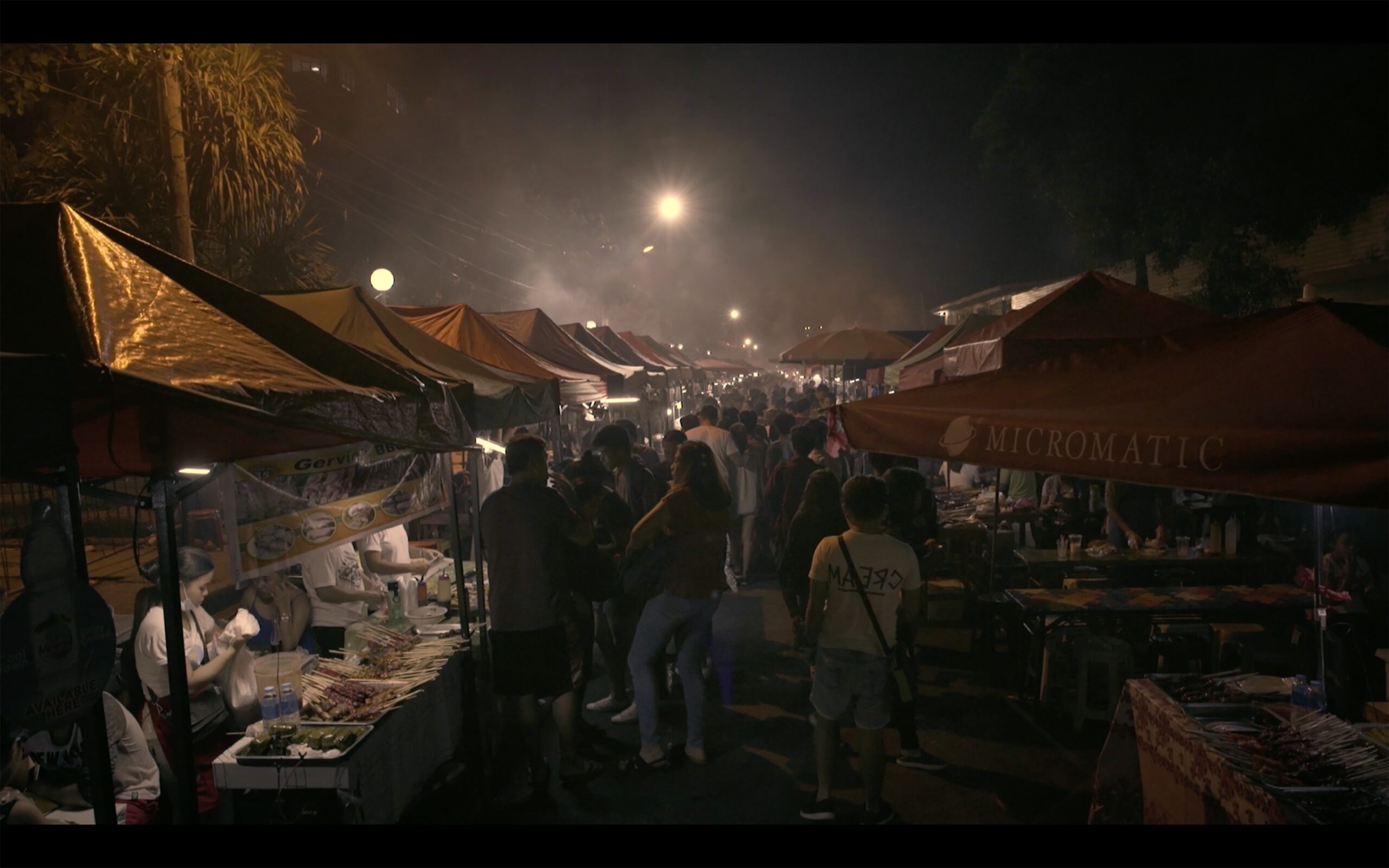| Title | The Songs We Sing in a Different Land |
|---|---|
| Director | Inshallah P. Montero |
| Producer | Docnomads |
| Cinematographer・Editor | Inshallah Montero |
| Sound Editing and Mixing | Margaryta Kulichova and Tarun Madupu |
| Country | Portugal, Belgium, Hungary |
| Year of Production | 2022 |
| VDP Selection Year | Laugh!-2023 |
| Screen Time | 26min |
| Subtitles | English/Japanese |
Overview
‘The Songs We Sing in a Different Land‘ sensitively focuses on a group of girlfriends who work as Overseas Filipino Workers (OFW’s) in Lisbon get together over lunch on their only day off on Sundays. They talk about living abroad, their work as household cleaners or nannies, their far away families and even their avid support for the president of the Philippines, Ferdinand “Bong Bong” Marcos Jr., the son of the late dictator of the Philippines. Through songs and conversation, this documentary presents how these women see the world and the deep motherly wound that the Philippines carries.


Inshallah P. Montero
Director
Inshallah has been making films and commercials since 2012. Her films have earned her the National Award for Cinema given by the National Commission for Culture and the Arts in the Philippines. She was named a Film Ambassador by the Film Development Council of the Philippines in 2018. Her films have been screened in various places including the United Nations and COP21 Climate Change Conference 2015. She has also worked on various journalism projects for Vice News, HBO, and the Washington Post where she and her team were finalists for the Asian Publisher’s Awards in the Women’s Issues Category. She has recently finished her scholarship in Docnomads, a joint master’s program for Documentary Filmmaking in Europe where she graduated Cum Laude. She is currently trying her best to make it possible to live away from the city.
Interview with the Director
What were your reasons for making your documentary?
How did come to focus on the topic in your documentary?
I have always admired women and have placed them at the center of many of my films. This is because my mother worked three jobs to support our family while my dad stayed home to take care of me. I realized that in the Philippines a lot of women are the breadwinners of their family.
The recent Philippine elections in 2022 also devastated me. I felt disowned by my country for voting in the son of a dictator. And so, I wanted to make this film, to try to understand his supporters and their personal stories; to see how we walked on different paths and arrive to a different understanding of what is right for our country. What unfolded were beautiful moments shared despite political views. This is the most important thing because it allowed discourse, deeper understandings of each other, and a shared respect of what each has gone through in their lives.
Commentary from the Screening Committee Members

Edward Paciano Delos Santos Cabagnot
Film Educator, Festival Programmer, Writer, Artist
The core of successful documentary filmmaking lies in its handling of The Human Experience. “The Songs We Sing in Different Lands” is no exception. Though many works, both fiction and nonfiction, have tackled the subject of the Pinoy diaspora, this technically polished oeuvre gave us refreshing insights into the OFW phenomenon. We’re introduced to an interesting mix of diverse Filipinas, each one with distinct political views and passionate advocacies. They are all willingly to set these aside -in typical Filipino manner- over food, song, and heartfelt sharing. More than the issues put on the table for discussion, a documentary truly works if what remains with you after the credits roll are the endearing people you met in the viewing.
Commentary for deeper understanding

Itaru Nagasaka
Professor, Graduate School of Humanities and Social Sciences, Hiroshima University
The “Songs We Sing in a Different Land” is about the experiences of Filipino women working in Lisbon, Portugal. Since the 1970s, the Philippines has sent many workers to various countries. As the opening of the film touches upon, the international labor migration of people has greatly contributed to the Philippines economy. However, it is important to note that behind the economic contributions of these “new national heroes” (bagong bayani) are the sacrifices made by these migrant workers, who are away from their families, working in foreign countries and sometimes under harsh working conditions. This documentary depicts the sorrow of these migrant workers and their struggle to cope with their situation, interwoven between scenes of them gathering on their days off to eat, sing, and laugh.
Since the 1980s, many Filipino women have traveled to East Asian countries, the Middle East, and Europe to work as domestic and care workers. In several scenes in the film, these women who worked overseas as domestic workers talk about having to leave their children behind when they were still young. For example, one woman who came to Lisbon after working in Saudi Arabia for 23 years says she “still regrets” not being there for her children when they were growing up. Another who says she has not seen her child once in the six years since she came to Lisbon is shown in video calls with her child in a small room. She asks what the child has eaten and then tells the child, “If you play outside, wash your hands before you eat.” This scene seems to depict how these women, who “only have money to give to their children” and “can’t hold their children’s hands when they have a fever,” try to connect with them on a daily basis whilst also caring for their well-being. And do the sounds of airplane engines and images that frequently appear in the film allude to the connected yet distant relationship between them working in Lisbon and their families living in their home countries or in other countries?
A feature of this documentary is the many scenes of them eating lots of food together and singing songs. Around 2000, I had an opportunity to live for a short time in Rome in an apartment where Filipino domestic workers lived, and at that time, my first impression was also that every day off, their relatives and friends would gather, eat, and sing together. In Lisbon, as I experienced in Rome, the Filipinos seem to cook the same meals and sing the same songs that they used to sing in the Philippines and laugh a lot. These moments of eating on days off, songs, and laughter, along with other objects strongly reminiscent of Filipino life and faith -such as the altar with a statue of Mary in a small room and the picture of the Last Supper hanging behind the dining table- seemed to have great significance as the women worked and lived away from their families in a foreign country. Yet, what was different from Rome, where relatives gathered on their days off, was the fact that in Lisbon, families were not so readily available, and as evidenced by the different perspectives on Filipino politics among the women, as those with different life experiences in the Philippines formed the group. Sa Ugoy ng Duyan (In English the sway of the baby cradle), a Filipino folk song reminds us of mothers who rocked cradles to remember separated families and they also sing “That’s what friends are for,” a popular American song in the Philippines. Through the way they create new intimate gatherings in another country, we see the energy and skills they use to survive in the modern world as well as their immigration situation in Lisbon.
Related Films
-

Timbre
Ever since the Duterte administration rose to power, nightly killings have terrorized the Philippines in an all-out government endorsed war on drugs campaign. This documentary follows the plight of a family who recently lost a loved one in this war, offering a stark personal perspective on the current political crisis in the Philippines.- Country
- Philippines
- Director
- Edrea Camille L. Samonte and Nicole Pamela M. Bareo
- Time
- 23min
-

Madame Lien’s Factory
“Madame Lien” is the head of third generation of her family to take over a shipyard where traditional wooden boats are built. Existing along the banks of the Mekong River for almost a century, it has witnessed many drastic times of changes. Today, sustainable development has become a goal along the river, yet parallel to this, as cities modernize, traditional values are gradually disappearing. This documentary focuses on Madame Lien and her efforts to keep the shipyard afloat. It dwells upon how it gives her life meaning as she remembers how she fought to preserve it in the past. This documentary poignantly presents a person with compassion toward her workers, her relationship with them, and how they have trusted and followed her their whole lives.- Country
- Vietnam
- Director
- Nguyen Thu Huong
- Time
- 30min
-

Through Songs, We Share Stories
There are many ways to convey the truth of an event to the next generation, and one of those ways is through singing what is written. This was the path chosen by the Dialita Choir in uttering the truth of the events they experienced in 1965. Although the lyrics revolve around the beauty of nature, parents, friends and love for the motherland, Dialita Choir tries to give another perspective in reading the dark history of past events.- Country
- Indonesia
- Director
- Dony Putro Herwanto
- Time
- 24min
-

That Night
“That Night” follows the lives of two survivors of the Roxas night market bombing in Davao City, the Philippines on September 2, 2016. It centers on a vendor at the market who was severely injured, and a truck driver whose wife and son died while getting a massage. The film documents the two survivors a year after the tragedy.- Country
- Philippines
- Director
- Jeremy Luke Bolatag
- Time
- 20min

Yoko Hayami
Professor, Center for Southeast Asian Studies, Kyoto University, Cultural Anthropology
Set in Lisbon, this film depicts the interactions among Filipino women working as domestic labor in foreign homes. Their relationships with their families and country are woven into their conversations. Visually, more than the depiction of their lives in the foreign country itself, or their relationships with their families, what is reflected here is the emotion that can be read in their demeanor and expressions. The film painfully conveys how the women try to overcome their various sorrows and frustrations by laughing together during the days away from their own families and country.